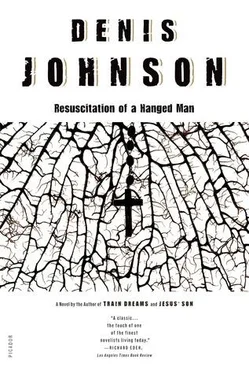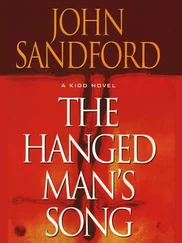English was lost. “Monthly payment for what?”
“For real estate, young man. A house, a piece of land. Possibly an apartment, if this agency handles rentals.”
“But he lives in Orleans. I stopped in and talked to the neighbors. They know him. He comes and goes. That’s where he gets his mail.”
“Perhaps he’s moved.” Sands looked amused.
“Now what?” English said.
“Do as much as you can over the telephone. Call these taverns, call Phil-Hack Realty, see what they have to say about Gerald Twinbrook. You can call the taverns tonight. They’ll be open. Use the phone in my office. Make a note of the calls. If you get no help, try the two art galleries.”
“What do I say?”
“Identify yourself and tell them you’re a detective — not a private detective, a detective. Don’t identify your client. Just say you’re trying to reach Gerald Twinbrook, Jr., on a routine matter. Give them a description if the name isn’t familiar. Did you get a description?”
“His mother says he looks like the people in his paintings and he has brown hair.”
“And what do the people in his paintings look like?”
“Tall and skinny, is about all.”
“He was in Walker’s Inn twice last month, and at this other one, what is it—”
“The Ends.”
“At The Ends at least once. They know him, I assume. They cashed his checks.”
“I’ll talk to them right away,” English said.
“Fine. But before you call anyone, find out if by any chance he has a telephone number in Marshfield. It’s possible you might be able to call Gerald Twinbrook himself.”
“I’m amazed.” English was telling the truth. It was something to see this detective indicate the blank space named Gerald Twinbrook by surrounding it with facts — like the pumpkin the school kid had surrounded with his arms, a while ago, on Commercial Street. “I could get to like this job,” English told his boss.
“Names and numbers.” But Sands didn’t look as triumphant as he might have. He waved English away from his sickbed. “Go. Go,” he said softly.
“I’ll be right back.” English was glad to leave.
Downstairs he turned on the overhead light in Sands’s office-studio, drew the curtains, and sat down in the swivel chair to play with the tennis ball that had been lying on it while he called the two taverns in Marshfield.
Both bartenders knew Jerry Twinbrook but hadn’t seen him in at least a couple of weeks. Evidently he was missing.
English put the tennis ball back where he’d found it and travelled up the stairs to report this news to Sands. But the detective was asleep, with his hands folded over his groin in an attitude that made English feel sorry for him, and English left him alone.
Grace Sands, however, was awake and active. He found her just inside the front door with a feather duster, stroking the two umbrellas that jutted from the ceramic umbrella stand. “I got a million things to do,” she was whispering, “a million things. A million.” In a worn grey dress with a white scarf tied around her head, she looked like a charwoman.
“Hi again, Grace,” English said.
“Bud is sick upstairs,” she told him. She’d said these very words on admitting him half an hour ago.
“Yeah, I just got done talking to him. He’s looking better.”
“I — is he gonna be all right?” Worry crumbled her soft old face. “What am I gonna do?”
“He’ll be fine.”
In English’s perception the lines of power in this household suddenly reversed themselves. He felt the presence of Sands, sick and asleep in his upper chamber, held aloft by the concern of this woman.
And then a curious impulse struck him, an idea he realized he’d been having all along. “Maybe you should go upstairs and see if he needs anything,” he suggested to Grace.
“Oh …”
He wished he hadn’t said it.
“Oh, all right.” She looked around like a person hopeless of finding one small item in a huge storehouse.
He wanted to take it all back. “I suppose he’s all right,” he told her. “Really.” But it was the wrong way to put it. Grace was preparing herself for the ascent, growing visibly heavier with the weight of determination. “Maybe,” he said, “I can find out if there’s something — I could bring it to him, tea or whatever.” English was desperate for her not to go now. He’d only wanted to have a look in Sands’s desk.
But she didn’t seem to hear him and hefted herself upward, one step at a time.
English moved into the office while she was still only halfway up the stairs. He slipped open the desk’s center drawer and found pens and pencils, a screwdriver, loose paper clips, a small kitchen knife, two worn gum erasers. In the two file drawers on the right there was nothing to catch his eye — they were just files, what had he expected? There was no file called “Truth Infantry,” nothing about “Agent Orange.” Everything seemed to be labeled “Correspondence.” “Correspondence — Harold & Fine,” “Correspondence — State Street Bank.” “Correspondence — BPA” turned out to be letters to and from the Boston Policemen’s Association.
That drawer was only half full. The lower one held files about John Hancock Insurance, T. Rowe Price investments, correspondence about a prize for the biggest fish, sponsored by the RCEB — Retired City Employees of Boston. A folder labeled ET CETERA was empty.
Behind the folders, in the back of the drawer, were stacked three blue-black American passports: William Michael Pierce, George Terrence Morris, Gregory Arn Shahan. The picture had been pried from each one. English thumbed them through, squatting on his heels by the open drawer, suddenly light-headed and unable to read, and then put them back stained with the sweat of his hands.
Things he’d seen at the movies prodded him to a nerve-racked microscopic study of the drawers he’d opened. Had Sands put a piece of tape or thread across their seams, in the hope of detecting any tampering? He picked up the tennis ball from the swivel chair and rattled it — for God’s sake, it was a tennis ball, a tennis ball. In the single left-hand drawer he found two more tennis balls, and a couple of chewy rubber toys with tin bells inside, for pets.
He left fast, and outdoors, as he found a cigarette, he promised the dark street that he’d keep his nose out of other people’s desk drawers and other people’s business, their phony passport business, or whatever it was.
As he waited in his Volkswagen beside Leanna’s building, English rolled down the window to let the cigarette smoke out and let in the chilly smoke of wood stoves in the houses up and down this quaint street of trees. He checked the contents of his billfold and prayed over his gas gauge, that it stay above Empty round-trip. In Leanna’s apartment the light went off. The hotel was dark now — three floors of historic wooden architecture, with assorted outbuildings named for famous women, most of them entertainers and none of them saints. “I got about thirty bucks,” he told Leanna when she reached the car. “Don’t break me.”
“It’s Dutch treat,” she said. “Is money tight?”
“I had car trouble on the way up here in December. The repairs ate up all my savings.”
They drove in what was for English a nerve-unraveling silence to that part of Hyannis, fifty miles down the Cape, where two shopping centers faced each other across the highway. “We’ll never find this vehicle again,” he told her. In the parking lot the million cars of late shoppers diminished from horizon to horizon. In his mind, the Cape’s population exploded. He’d thought himself almost alone on this peninsula, but now he felt crowded. It was almost eight, but all the stores were open. English and Leanna found their way across the random paths of citizens into the mall, past one goods-glutted window after another, and down into a tiny basement restaurant something like a cave. “Are we dealing with Italian or Mexican?” English couldn’t tell. Candles in Chianti bottles on the tables and sombreros stuck flat against the walls mixed up his expectations. “It’s omni-cuisine,” Leanna told him. “Shopping-centeranian, I guess. But the food’s wonderful. This is the best table, right here.”
Читать дальше












